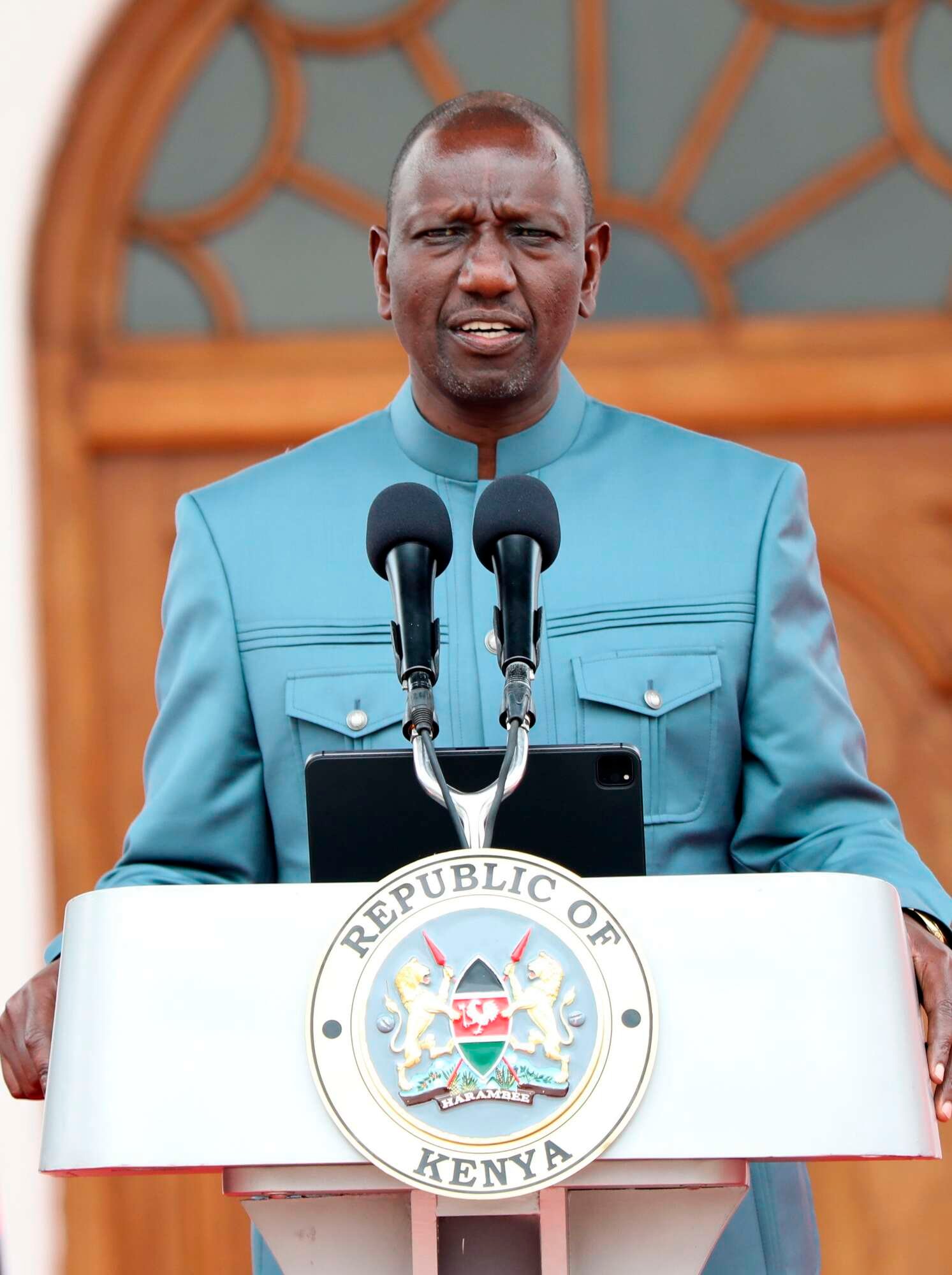[ad_1]
Economy
Global supply shocks fuel new food crisis in Kenya
Thursday August 03 2023
President William Ruto addressing the nation at State House, Nairobi on August 2, 2023. PHOTO | LUCY WANJIRU | NMG
Global supply shocks have increased the prices of Kenya’s critical staples, including rice, wheat, maize, sugar and onions, fomenting a new food crisis in the country.
Protectionist decisions in India and Eastern Europe to lock stocks of food within their borders are likely to disrupt the supply of rice and wheat into Kenya, even as poor weather hinders the supply of onions from neighbouring Tanzania.
Wheat prices are also likely to come under pressure after Russia, which is at war with Ukraine, recently pulled out of an agreement which allowed the export of Ukrainian agricultural goods via a safe channel through the Black Sea, putting Africa’s food security at risk.
Russia also destroyed critical storage infrastructure in Ukraine in a bomb attack, triggering supply disruption fears, which is driving up prices.
The latest supply shocks are aggravating the prevailing food crisis related to the Ukrainian war and the lingering effects of the Covid-19 pandemic, which have increased the prices of cooking oil, maize and wheat products.
Analysts fear that the new crisis is likely to heighten food scarcity, rolling back some of the gains the country recently made.
Consumer prices in July rose by 7.3 percent, the lowest since May last year.
This even as President William Ruto on Wednesday spoke of the gains the country had made in food production since his administration launched a fertiliser subsidy programme aimed at boosting yields of staple crops.
“Because arable land in Kenya is limited and our population has increased over the years, the only way to increase agricultural productivity is through the use of high-quality inputs and, in particular, fertiliser which significantly increases crop yields in the same area of land,” said Dr Ruto.
Read: Duty-free imports no panacea for food crisis
India, a major supplier of rice to Kenya, recently banned the export of the commodity in a move that is likely to cut the supply of the cereal that has come to feature prominently on Kenyans’ dining tables.
The reduced supply of rice from India—estimated at around 676,727 tonnes valued at Sh34.3 billion, according to official data—is likely to drive up its retail price.
India, the world’s largest rice exporter, banned the exports of non-basmati white rice on July 20, as the government sought to tame surging domestic food prices and “ensure adequate domestic availability at reasonable prices.”
Dr Timothy Njagi, a research fellow at Tegemeo Institute, a public policy think-tank, said the ban on rice exports by India will not have a huge impact on Kenya as traders might switch to other sources, including Pakistan, Thailand, Vietnam, Cambodia or even neighbouring Tanzania.
“Most likely, we will go back to Pakistan,” said Dr Njagi.
Kenya’s production of rice cannot meet its demand, which has been steadily rising in the past 10 years as consumer tastes shift.
The East African nation, which used to get most of its rice imports from Pakistan, has increasingly turned to India for the supply of the cereal.
India had earlier also banned sugar exports, a move that saw Kenya rely heavily on expensive imports from neighbouring Uganda.
Data from the Sugar Directorate show 68 percent of the 21,887 tonnes of table sugar that Kenya imported in May came from Uganda, while shipment from India, which was the previous month’s leading source of the commodity declined to 24 percent.
India has warned that the changes in the weather pattern it is experiencing could reduce rainfall and dent production, impacting the available local stock for its people.
Prices of sugar have been rising, following the decision by the government to close sugar factories to reportedly prevent the harvesting of immature cane.
President Rutoon Wednesday said that having not found sugar supplies within the Common Market for Eastern and Southern Africa (Comesa), Kenya was forced to look outside the regional economic block.
Imports from Russia, including wheat and fertiliser, have also been hampered by sanctions against the Eastern European country by the US and the European Union.
Free fertilisers
During the Plenary session of the ongoing Russia-Africa forum, Russian President Vladimir Putin noted that his government had intended to send free fertilisers to a lot of countries but they had only managed to send the input to Kenya and Malawi.
Read: Ministry develops Kenya food security master plan
Kenya received 34,000 tonnes of the free fertiliser while Malawi got 20,000 tonnes, said Mr Putin.
“All the rest remained in the EU and that has happened because we are talking about a purely humanitarian campaign that should not be subjected to any sanctions whatsoever,” he said.
Maize imports during May and June 2023 were also significantly low compared to imports during the same period in 2022, according to a report by the Ministry of Agriculture on the status of national food security in June.
“According to the Kenya Grain Millers Association, the reduced imports are due to the general tight global market (low supplies), coupled with reduced local demand, which is attributed to low consumer purchasing power,” said the report which was released by the State Department for Crop Development.
Tanzania has also reduced its exports of onions to Kenya, pushing up the price of the vegetable, the latest data from the national statistician shows.
To protect its food stocks, Tanzania has imposed stricter food export permit controls to discourage outsiders from buying maize from the country.
→[email protected]
[ad_2]
Source link



